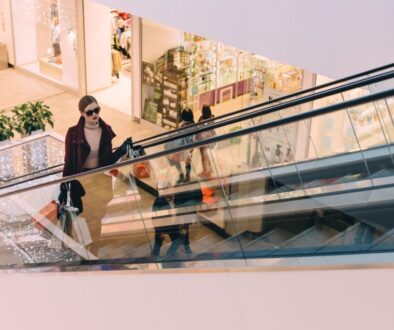Modern Retail: What can we learn from concept stores
As more of us shop online, the role of the bricks and mortar store is evolving and taking on a new relevance. And it’s the concept stores that are leading the way when it comes to re-imagining the physical retail experience in the age of e-commerce. Great concept stores across the world are drawing inspiration from magazines, museums, and the hospitality sectors to create big attractions for modern shoppers. From New York to London, Paris and Berlin, we look to some of our favourite concept stores to find out what they’re doing right.
Collaborate with the best in the business
Since opening its doors almost two decades ago, Paris’ three-level concept store Colette has upheld its iconic status as a go-to destination for fashion-lovers across the world. Launched by mother-daughter duo, Colette Roussaux and Sarah Lerfel, it was arguably the first of its kind – a store offering a carefully curated microuniverse of cool, with everything from books to accessories, toys, art, candles, gadgets, cosmetics and designer clothing.
What has helped Collette maintain its cult success, however, is its ability to mastermind the designer collaboration. Partnering up with everyone from Levi’s to Disney, Hermès and Nike, the Parisian concept store has managed to remain top of the radar for the last two decades. Limited edition, themed design collaborations and collections give the store an ever-changing, fresh perspective that keeps ahead of the curve.
Don’t make it feel like a shop
Places such as Voo Store in Berlin, the iconic Dover Street Market, and LN-CC in East London are great examples of stores that engage their customers by letting them explore multi-sensory displays that can only really be experienced in person. LN-CC is based in a former boxing gym and has built its reputation on the idea of “experiential retail,” striving to make an “all encompassing world” that doesn’t feel like a shop and doesn’t care if the consumer visits without buying anything.
Over in New York, The Apartment by The Line, draws you into the intimate setting of a beautiful SoHo apartment. Curating an aspirational lifestyle in context. With just one of each object carefully displayed, the space doesn’t feel like a store, more like the home you’d dream to own, so it’s hard to not to have the desire to purchase.
Tell stories and keep them fresh
When brands are able to find ways to express themselves in the physical world, they create much stronger connections to people than online. This was the insight that inspired retail industry veteran Rachel Shechtman to launch Story, a 2,000-square-foot retail space, in Manhattan in 2011. The retail space truly re-invented the concept store, describing itself as a space that “takes the point of a magazine, changes like a gallery, and sell things like a shop.” The concept store quickly gained its stellar reputation as a new type of shopping experience, catering to an audience “aged 5 to 95.”
The store uses brands as sponsors, elevating their stories through merchandising and experiences. Brands enter the physical space as part of a curated story, a central theme that changes every four to eight weeks. There have been themes such as “Good,” a showcase of purpose-driven brands, and “F-word,” an exploration of modern feminism, and “Remember When,” a celebration of 90’s nostalgia sponsored by Nickelodeon.
“If time is the ultimate luxury and people want a higher return on investment of their time, you need to give them a reason to be in a physical space,” Shechtman told Business of Fashion. She believes Story gives big brands a chance to experiment like a startup and show their human side through different forms of storytelling.
Merge hospitality with retail
Step into an Ace Hotel lobby and you’ll see how the world of hospitality and retail are converging: the lobby buzzing with people at all hours spills into a flower shop, a boutique, a vinyl store and juice vendor. The space serves as a multi-functional hub to both its guests and surrounding community.
Many modern concept stores have used this blend of retail and hospitality to offer the surrounding community something extra. Concept stores such as Voo Store in Berlin and Modern Society in Shoreditch do this by hosting coffee bars in their space.
“Once you understand what your customer wants, you can create an additional service layer to the experience. If Modern Society were in Los Angeles, for example, we might be serving juice instead of coffee,” says Nazifa Movsoumova, who launched her store on Redchurch Street last year. The beautiful space invites passersby to drift in for a coffee, or stay the afternoon with your laptop, whether you choose to browse their carefully selected products or not.
Build a community
While hospitality, curation and experiential installations can transform a retail space, great retailers understand that the end goal of these efforts should be to foster community. Building a sense of community around a physical store is a powerful way for stores of the future to thrive.
In our connected world, there has never before been such widespread desire for consumers to identify with communities who share their values – both online and off. Great concept stores are recognizing this fact and thinking about how they can use their spaces to create shared experiences between people in real life.
Hosting talks, seminars and events in the retail space is a great way of doing this. Manhattan’s Story offers an excellent example. By regularly hosting ‘pitch nights’ that accommodate local entrepreneurs, the concept store creates a platform for business exposure and knowledge-sharing.
Concept stores of the future will continue to break the silos of traditional retail. They will act as cultural destinations, playgrounds, knowledge-sharing hubs and discovery platforms. And, as big brands continue to explore new ways of connecting with consumers offline, this should present new opportunities to collaborate with stores of all sizes.
Source: Appear Here Blog – http://ow.ly/yC1a30ckjnS




